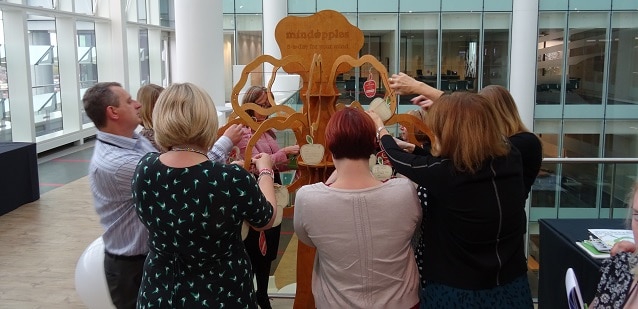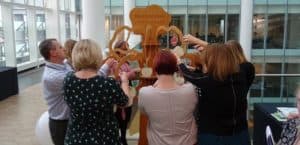
We’re delighted to be working with Wragge Lawrence Graham & Co LLP.
Here’s what their Peter Bond wrote in a blog about the launch:
“You often hear about mental health in the news but it’s all too often linked to a negative story. Mental health tends to have connotations of illness, rather than have the positive associations of fitness that come with physical health. Many of us focus on our physical health, whether going to the gym, cycling, practising yoga or simply going for a walk, but when it comes to our mind, it’s a different story. We tend to neglect our mind, hoping it looks after itself.
At Wragge Lawrence Graham & Co, we’ve just introduced ‘A Mind for Business’ programme in association with Mindapples, an organisation that wants to increase our understanding of our minds and raise awareness of the importance of good mental health. In the same way we eat – or at least try to eat – five portions of fruit and vegetables each day, can we apply the same thinking for our minds?
Following on from the launch event introducing the Mindapples concept, I immediately signed up for the first workshop: ‘Train Your Mind’.
During the course of the workshop, I learned more about myself than I expected and it was reassuring to hear that we all have limits to what we can do! It sometimes feels we need to remember so much information and it was encouraging to know it’s not always possible to remember everything, but the more we learn, the better we remember.”
So what did the workshop entail? One activity involved a jumble of 30 letters appearing on screen – the challenge was to remember as many as possible in 15 seconds then write them down. As they were random, you could remember a maximum of around 10. Those same letters, rearranged, made up a famous Shakespeare quote. Of course, if asked to remember the letters in “To be or not to be that is the question”, everyone could – they are familiar so we remember them.
Another key takeaway from the workshop was around unconscious habits and, importantly, why I do them. The afternoon lull to go and make a cup of tea isn’t necessarily because I’m thirsty, but just my mind wanting a break from work. The cup of tea is secondary and comes as part of the deal. Similarly with the biscuit tin, its just the action of breaking away, I don’t need the biscuit and my mind would just as happy for me to walk around block, a new positive routine which is ideal for the pre-Christmas diet!
Some people don’t want to associate themselves with anything mental health related due to the stigma linked to the words alone, but I want to reassure anyone thinking about attending the future workshops at WLG, or elsewhere, (running until March 2016), that these are to help with our thinking and how we work. They are not about depression or ill health, quite the opposite.”
Read the article here

